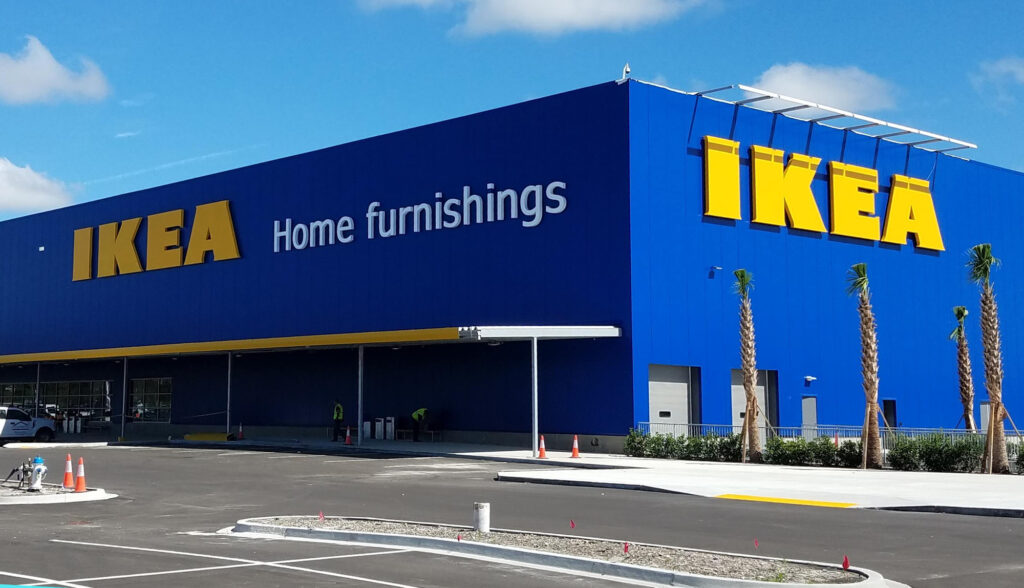INTRODUCTION
If you’ve ever visited an IKEA shop, you know how difficult it is to leave on time. You had no clue you needed five new dishtowels until you got there, but now you do. All of this is down to the late Ingvar Kamprad, a Swedish entrepreneur who pioneered the notion of an easy-to-assemble furniture store.
Kamprad died in 2018, but the history he built, which made IKEA one of the world’s most well-known businesses, has long been a tale for the affluent. IKEA has developed an app to provide consumers in India with an online shopping platform to boost sales during the outbreak.

The iOS and Android versions of the app were released in May 2021. The company’s downloads have surpassed 10 million, and the Google Play Store has a 4.2 rating. It shows you images of numerous interior styles so you can find the furnishings you desire.
By scrolling and exploring, you may add your preferred items to your shopping list. IKEA Family Cardholders may use the app to earn discounts. The app also disclaims any user information it collects.
IKEA, a Swedish business, entered the Indian market in 2018 with a luxury 400,000-square-foot warehouse in Hyderabad. Despite this, the DIY furniture colossus has encountered a lot of challenges, including the COVID-19 closure, which hindered its expansion plans.
By infusing this concept throughout every aspect of the firm, including design, procurement, packaging and distribution, IKEA has effectively capitalized on a distinctive low-cost business model. At all stages of the process, low costs need low cost, efficient operation.
Because of its shown ability to continually produce high-quality products at inexpensive prices, IKEA is a clear winner by simplifying its whole supply chain, operation and inventory management, to support the low-cost value-added consumer product offering.
To deal with these unanticipated delays, the furniture sector – which frequently encourages customers to check their stores, verify their collections, and spend time in their cafés – has developed a mixed approach to expand in India.
It intends to establish little shops throughout Mumbai, in addition to the shop in Navi Mumbai, to discourage people from travelling long distances and buying at home.
EARLY DAYS
IKEA has been the leading retailer of furniture in the world since 2008, founded in Sweden by 17 years old Ingvar Kamprad, in 1943. IKEA’s business plan is, “To deliver well-designed, functional home furnishings at prices so low that as many people as possible can afford them.”

Furniture has always been seen as a substantial investment and a more permanent item in the home. IKEA has altered people’s perceptions of furniture by providing well-designed products that are intended to be used immediately and discarded after a short period.
This is achieved through designing home furnishings that blend usefulness, quality, design, and value.
MARKETING STRATEGY
The value chain begins with the product’s design and image. IKEA is known for designing goods with low manufacturing costs and rigorous function, quality, and distribution requirements.
IKEA strives to utilise as few materials as possible in the manufacture of its furniture without sacrificing quality to save packing, handling, and supply costs.
Customers are subsequently given flat-packed, ready-to-assemble items based on purposeful design considerations that save money on shipping, storage, building, and assembly.

IKEA, a large, worldwide retailer providing items from more than 1,800 suppliers in 50 countries, recognises the necessity for excellent communication and connections with material suppliers and manufacturers.
The 43 local trading offices in 33 countries that manage supplier links make sure that over 95% of the stock is always accessible. This is demonstrated by their local businesses. Due to its scale, should IKEA not encourage competition and oppose its sellers?
No. IKEA thinks that by signing long-term contracts it can create long-term business ties with its suppliers and that the costs of goods delivered may be low and sustained in its volume business.
IKEA has developed a lean operational model to support its goal of “providing a variety of home furnishers that is affordable for many, not just a few,” beginning with the showroom layout and the pioneering idea of allowing consumers to assemble them themselves.
These emphasized approaches, together with the many other different operational components not mentioned here, have created IKEA the world’s most successful store, with high product demand and minimal operating expenditures.
FUNDINGS
Because franchising generates the bulk of IKEA’s revenue, the majority of its stores are franchised, with the balance being corporate. Every store, including those owned by businesses, is required to pay an annual franchise fee. IKEA’s attractiveness to customers is enhanced by its commitment to environmental sustainability.
REVENUES AND LOSSES
During the first government-enforced lockdown, which began in mid-March last year, Ikea, like other businesses, closed its physical stores. After the initial wave of the virus loosened limitations, it reopened in June.
It had to close in late October and November, as well as between January 1 and May 1 of the following year.
Ikea’s revenues fell last year as a result of the coronavirus outbreak and according to recent estimates, Ikea’s pre-tax revenues dropped from € 11.07 million in the fiscal year ending 31 August 2020 to barely € 3.7 million the following year.
Revenues decreased 13%, from €203.5 million to €176.6 million, with an increase in online sales only partially compensating for the drop. Ecommerce sales increased to about €42.3 million, accounting for 24% of total sales and this compares to a 16 per cent rise in sales, or €32.6 million, the prior year.
ACQUISITIONS
IKEA has acquired three companies and made nine investments. The purchases cost the firm more than $2.60 billion. IKEA has made investments in a variety of areas, including HRTech, Local Services, and more.
One such IKEA’s acquisition is TaskRabbit which is a website that fits customers with “Taskers,” personal service providers such as home cleaning, gardening, shopping, arranging events and more.
CONTROVERSY
For more than 70 years, admirers of Swedish furniture have anxiously awaited the yearly publication, which is full of new items and ideas for home décor in every family.
Over 200 million copies of the meticulously crafted IKEA catalogue have been created, placing it with the Bible, the Quran, and Harry Potter in popular circulation.
In the middle of the 296-page book, a single photograph created a delay. Because IKEA has requested that the image in this story not be shared, you’ll have to use your imagination to figure out what’s going on.
Consider a full-page illustration of a young black man with a cast leg and fingertip, maybe as a consequence of a skateboarding accident, as evidenced by props on the left side of the frame. He appears to require assistance putting together a coffee table as he looks down.
This website is primarily meant to advertise TaskRabbit’s IKEA furniture assembly services. The point of dispute is the t-shirt: A serial number sequence on the back of his house (45678), which feeds a bad perception of Black youth, may also be viewed as serial numbers on a jail prison prisoner’s clothing, according to an employee.
AWARDS
IKEA has received several design awards throughout the years, including this year’s seven Red Dot Awards for Product Design. The Red Dot Award is a prestigious award given by an international committee to products that have an outstanding design. Meet the designs that have won awards…
Other than that award of Catalyst 2030 was also conferred to the company. Catalyst 2030 is a worldwide movement of social entrepreneurs and innovators from a variety of industries who have come together intending to develop innovative, human-centered approaches to achieve sustainability goals by 2030.
IKEA won the corporate award for its open, collaborative mindset, deep empathy for social issues, and unwavering involvement with social entrepreneurs across the value chain and beyond.
The prize was accepted by Jon Abrahamsson Ring, Inter IKEA Group CEO, Sa Skogström Feldt, IKEA Social Entrepreneurship Manager, and Vaishali Misra, IKEA Social Entrepreneurship Business Leader.
FUTURE PROSPECTS OF IKEA
Ikea has revealed plans to establish 50 additional shops across the world, in addition to the 445 now operational. Furniture store in Sweden. E-commerce now accounts for 18% of total sales, up 11% from the previous year, with total sales decreasing 4% to €39.6 billion in the fiscal year ending August 2020.
Ikea’s ambitious plans for India, however, may encounter stiff competition from the richest Asian man, Mukesh Ambani, who recently purchased a local furniture e-tailer as part of his conglomerate’s bid to control India’s $1 trillion consumer retail market.
In the two years after Ikea opened its first store in Hyderabad in 2018, the proportion of items and materials sourced from India has only been increased to at least 30%, to meet local needs. Betzel stated, “Absolutely,” that this was possible.
Betzel said it hoped to open stores in 30 Indian cities in seven years, while another company opened a store on the outskirts of Mumbai in December. Another 12-month period is currently underway in Southern Bengaluru, according to Betzel.
CONCLUSION
IKEA is currently the largest furniture retailing company in the world with 315 stores in 27 countries and over $35 billion of sales. More than 715 million customers visited Swedish retail outlets in 2014, even though internet purchases undermine the traditional paradigm in retail.
It has positioned itself in a highly competitive industry as a distributor for affordable, high-quality furniture. It would be an interesting watch to see how the company will perform, especially in India where people have options available from the start.
For more news and information on startups, stay tuned to StartupTrak.



